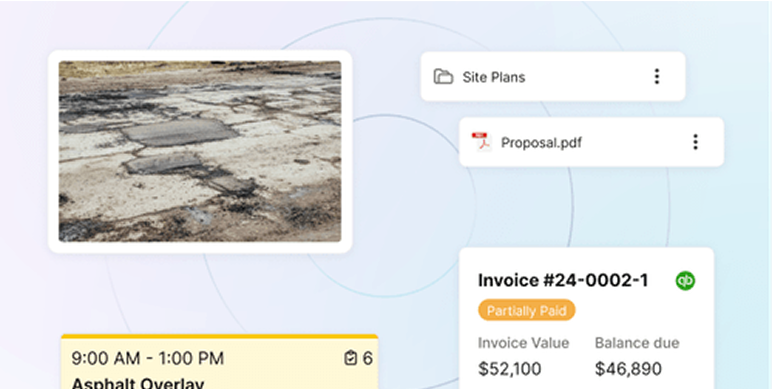Asphalt Grades: 2026 Guide to Types, Textures + Uses
Imagine you're standing between two parking lots. One's already cracking after two winters. The other looks fresh after five years.
The difference? Someone picked the right asphalt grade.
Whether you're a contractor bidding on projects or a property owner planning repairs, understanding asphalt grades means getting pavement that lasts.
Our guide covers all 7 types (HMA to RAP), explains the PG rating system contractors use, reveals why premium grades cost more, and shows exactly which grade matches your climate, traffic, and budget. We’ll also introduce you to OneCrew, the platform specifically designed for paving contractors’ project management.
What Are Asphalt Grades?
Asphalt grades are classification systems that categorize asphalt based on performance characteristics, including temperature resistance, durability, and binding properties.
The Performance Grading (PG) system uses a common battery of tests, but it specifies that a particular asphalt binder must pass these tests at specific temperatures, which depend on the specific climatic conditions in the area of use.
Each grade serves specific purposes, from heavy-traffic highways to residential driveways.
Why does grading matter?
Grading matters because it directly impacts pavement performance and longevity. The right grade ensures your asphalt withstands local conditions and traffic demands. Here's what proper grading affects:
- Durability: Higher-grade asphalts resist rutting and cracking under heavy loads
- Temperature resistance: Grades determine performance in extreme heat and cold
- Texture and traction: Different grades create smooth or coarse surfaces for specific needs
- Cost-effectiveness: Matching grade to application prevents overbuilding or premature failure
- Installation requirements: Some grades need specific temperatures and equipment
- Maintenance frequency: Premium grades often require less frequent repairs
Common Types of Asphalt Grades
The most common asphalt grades include Hot Mix (durable for highways), Warm Mix (energy efficient), Cold Mix (quick repairs), and Dense-Graded (impermeable surfaces).
Contractors and engineers choose from several asphalt mix types based on project requirements. Each type offers distinct advantages for specific applications, from high-traffic highways to eco-friendly parking lots.
Hot Mix Asphalt (HMA)
Hot mix asphalt is made by heating a mixture of aggregate (crushed stone, gravel, and sand) and asphalt cement at temperatures around 300–350 degrees Fahrenheit (~177°C). HMA remains the most common paving material for major infrastructure projects.
Warm Mix Asphalt (WMA)
WMA produces quality pavement at lower temperatures than traditional hot mix. WMA is manufactured between 200 and 250 degrees Fahrenheit (~121°C), using special additives and processes to maintain workability.
Cold Mix Asphalt
Cold mix asphalt works at ambient temperatures, making it ideal for winter repairs and emergency patching. Since it's already cold, you can apply cold mix asphalt in extremely low temperatures.
Dense-Graded Asphalt
Dense-graded mixes combine various aggregate sizes to create tight, impermeable surfaces. Dense-graded mixes are generally referred to by their nominal maximum aggregate size. They can further be classified as either fine-graded or coarse-graded.
Open-Graded Asphalt
Open-graded asphalt prioritizes drainage over density. Open-graded mixes use only crushed stone (or gravel) and a small percentage of manufactured sands, creating permeable surfaces that channel water away quickly.
Porous Asphalt
Porous asphalt manages stormwater while providing durable pavement. Its permeable surface allows water to drain through. Drainage then goes into a stone recharge bed and drains into the soil.
Recycled Asphalt Pavement (RAP)
RAP incorporates reclaimed materials from old pavements into new mixes. The RAP in this new roadway reduces the amount of required virgin asphalt and aggregate, saving both money and the environment.
Note: Learn more about maintaining your asphalt in our dedicated article on the subject.
Asphalt Texture and Driveway Types
Asphalt texture affects both performance and appearance. The surface texture you choose impacts traction in wet conditions, noise levels, and how quickly the pavement wears.
Smooth surfaces work best for driveways and parking areas where appearance matters. These fine-textured asphalts create uniform black surfaces that enhance curb appeal. Coarse textures provide better traction for slopes and areas prone to ice formation.
Types of asphalt driveways
Property owners typically choose from three main driveway options:
- Standard driveways use conventional dense-graded mixes that balance cost and performance. These driveways last 15–20 years with proper maintenance and handle typical residential traffic well.
- Premium driveways incorporate polymer-modified binders or specialty aggregates for enhanced durability. The higher initial cost pays off through extended life and reduced maintenance needs.
- Recycled asphalt driveways offer budget-friendly alternatives for rural properties or temporary surfaces. Although it’s less durable than virgin asphalt, RAP driveways cost significantly less and work well for low-traffic applications.
Note: Planning a paving business? Check out our article on starting an asphalt business for startup guidance.
Choosing the Right Asphalt Grade
Climate drives asphalt grade selection more than any other factor. A binder used in the Sonoran Desert of California/Arizona/Mexico would have different properties than one used in the Alaskan tundra.
Cold regions need flexible binders that resist thermal cracking, whereas hot areas require stiff mixes that won't rut.
Traffic load determines the structural requirements. Heavy truck traffic demands robust mixes with strong aggregates and polymer-modified binders. Light residential traffic allows for standard grades that cost less.
Budget constraints often require balancing ideal specifications with available funds. Smart contractors recommend grades that meet minimum performance requirements without unnecessary overdesign.
Residential vs. commercial considerations
Residential projects prioritize appearance and quiet performance. Homeowners want smooth, attractive driveways that enhance property value. Standard dense-graded mixes typically meet these needs at reasonable costs.
Commercial projects demand durability above all else. Parking lots, loading docks, and access roads see constant heavy vehicle traffic. These applications justify premium grades with enhanced rut resistance and longer service life.
Commercial sites also face stricter regulations. Many municipalities require specific grades or recycled content percentages for public projects. Contractors must verify local requirements before specifying materials.
Long-term ROI of premium vs. standard grades
Premium grades cost more upfront but often double pavement life. A standard driveway might need replacement after 15 years, but premium materials last 25–30 years with similar maintenance.
Calculate total lifecycle costs, not just initial installation. Premium grades reduce maintenance frequency, minimize business disruptions, and maintain better appearance over time. For high-visibility commercial properties, these benefits often justify the extra investment.
Standard grades make sense for temporary installations or low-traffic areas. Rural driveways, overflow parking, and seasonal roads can perform adequately with basic materials. Match the grade to actual needs rather than overbuilding every project.
Note: Explore essential paving equipment and discover diverse sealcoating equipment options.
How OneCrew Helps Contractors Manage Asphalt Projects
Running paving projects means tracking dozens of details, from asphalt grades to crew schedules. When you're juggling estimates, material orders, and invoicing across multiple jobs, that's where OneCrew makes the difference.
OneCrew gives paving contractors one platform to run everything from estimate to invoice. The platform helps you track material specifications, including which grade gets used on each project, building a searchable history for future reference.
Here's what OneCrew brings to asphalt contractors:
- Estimate from PDFs or maps using labor, material, equipment, and sub-line items for accurate project pricing
- Build professional proposals that win more jobs and get approved faster through the customer portal
- Schedule and dispatch crews efficiently, assigning teams and equipment to specific job phases
- Track job costing and time to understand where you make and lose money on each project
- Process invoices and payments with QuickBooks integration, keeping your financials organized
- Provide customer transparency through a portal where clients approve proposals, pay invoices, and share documents
Your estimators can reduce estimating time by 75%. Your operations team assigns crews to the right phases. Your customers get professional documentation and easy payment options.
OneCrew brings your estimating, scheduling, and customer communication into one organized platform. Book a demo with OneCrew and see how the right platform transforms your paving operations.
FAQs
1. What grade of asphalt is best for driveways?
The best asphalt grade for driveways is typically a dense-graded hot mix asphalt with a PG 64-22 binder in moderate climates. This grade provides good durability for residential traffic while remaining cost-effective. Colder regions may need PG 58-28 for better crack resistance.
2. What is Grade A asphalt?
Grade A asphalt refers to a classification in some state specifications for dense-graded HMA with high-quality aggregates. Class A dense-graded asphalt requires at least 90% of the coarse aggregate to have at least one fractured face.
3. How long does each asphalt grade last?
Dense-graded HMA typically lasts 15–20 years, while premium polymer-modified mixes can exceed 25 years with proper maintenance. Cold mix patches last 1–2 years as temporary repairs. RAP driveways generally last 10–15 years, depending on traffic and climate.
4. Can recycled asphalt be used for driveways?
Yes, recycled asphalt works for driveways, particularly in rural or low-traffic applications. RAP contains about 4–6% of asphalt content from the original binder, providing some binding properties.
5. What's the difference between dense-graded and open-graded asphalt?
Dense-graded asphalt contains various aggregate sizes that pack tightly, creating impermeable surfaces ideal for driveways and parking lots. Open-graded asphalt uses mostly coarse aggregates with gaps between particles, allowing water to drain through.


